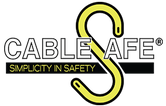Contributor: CableSafe®
Globally, falls are contemplated to be the second leading cause of accidental deaths. Considering this crucial fact, slip, trip, and fall accidents call for global attention towards the utilization of effective prevention measures and strategies. Furthermore, fall prevention has been a substantial area of concern, owing to the fact that slip-and-fall accidents are one of the leading causes of injury at the workplace. As trip and fall prevention sustains to be a challenge itself, here are some simple tips to prevent falls and fall-related accidents.
1. Maintain Workplace and Remove Falling Hazards
Well-maintenance of the workplace and removal of slip, trip and fall hazards can be key factors to deter the frequency of fall accidents. Contaminants like water, oil, grease, food should be removed from the floor, and entry into wet areas must be prevented through signboards and barricades. Check that stair treads are slip-resistant; and install handrails, anti-slip mats, and fall protection equipment for workers. Fall protection includes Personal Protective Equipment (PPE) such as hard hats, fall protection harnesses, scaffolds, and guardrails.
2. Clear Out Clutter to Avoid Trip Hazard
An effective strategy for trip control is to keep walkways, corridors, and passageways clear of any obstructions and trip hazards. To eliminate clutter, storage areas can be organized and unnecessary equipment, boxes, stands, etc. should be withdrawn from hallways and staircases. Designating areas for waste collection and making clear the responsibilities for waste removal can assist in avoiding waste obstacles from worksites. Snow removal from parking and sidewalks of the workplace is counted as an effective tactic to abstain from slips, trips, and falls.
3. Control Individual Behavior
Training of personnel to avoid behavior that leads to higher fall accident risks is a noteworthy guideline of simple tips to prevent falls. Fall prevention training programs effectively dictate the significance of the safety of workers. Provision of training for new hires and regular onsite training can ensure the avoidance of any onsite hazard. While working with ladders, employees should know to maintain three points of contact and keep the ladder on a level surface. Workers should refrain from taking shortcuts through restricted areas and avoid leaving equipment at work areas for trip control.
4. Adequate Lighting at Workplace
To evade slip and trip hazards, adequate lighting is the most worthwhile point among tips to prevent accidents. Installation of bright lights in stairways, basements, construction areas, and dock areas can minimize the trip hazards to a greater extent. Besides, make sure that exterior walkaways and driveways are well lit.
5. Wearing Appropriate Footwear
The selection of proper footwear is imperative in the prevention of slip and trip hazards. For on-site workers, it is vital that they must have a firm grip on the ground, therefore slip-resistant shoes are crucial as they provide comprehensive protection and slip control. As many variations of slip-resistant footwear are available in market, management should choose the best-fit relative to its work domain.
